OPINION: The real story of inequality in Mogadishu


By Hassan Mudane
In this new observation, I reflect on what worries me most about contemporary Somalia (Soomaaliyada Cusub). This is not so much the objective realities of hugely mounting inequalities in the last decade, but the normative acceptance by persons of privilege (with belly fat and big beard) that these inequalities are inevitable, even legitimate.
I worry about the manner in which inequality and subaltern minorities, is normalized in the middle-class (Dheregsan) in a way that would have been unthinkable in the years of my growing up.
In my mother country, Somalia, as in much of Africa today, powerful economic and political elites still determine State priorities and resist policies aimed at creating a more equal Africa. The world, therefore, remains one in which the destinies of poor people, women, and members of disadvantaged communities remain unchanged. People of privilege in Mogadishu have for too long looked away from enormous suffering and injustice which surrounds them.
We need to insist on debating the central questions on which the future of our people rests: How can public services better and more accountably deliver quality health, education, and social security to poor people? How can we defend human rights and dignity in areas where the Baahan classes are battling the Dheregsan elites and big companies? How can all young people be assured jobs and hope?
However, during my time in the city, I observed two classes: Dheregsan and Baahan:
Baahan vs Dheregsan
“What the Dheregsan class, therefore, produces, above all, is its own grave-diggers. Its fall and the victory of the Baahan class will be inevitable.” It is the baahan class, rather than a Dheregsan, which can be described as ‘the masses’ in Somali societies, particularly Mogadishu-based residents. The Baahan is thus a class of individuals whose main source of livelihood is a waged job work, whose aim is to survive. Baahan is the particularly vulnerable class because they are
the individuals furthest away from the state. They have little access to government institutions and the power that these institutions bring.
On the other hand, in the search for Dheregsan class, then it is wise to lean heavily on Marx’s work. After all, the Dheregsan elites use its position to exploit the masses, accumulating capital at their expense. The point is, however, that it may be that this dheregsan elite uses both political strength and economic power, to achieve and maintain its position of dominance. The Dheregsan elites are not necessarily the class that owns the means of production but is more likely to be the class that controls the means of political power. In other words, a politically advantaged class has the power to take economic surplus from wherever it finds within the country. This class has little part in producing a surplus itself but still has the ability to appropriate the capital generated for its own members’ use.
Not surprisingly, if political power is so important in identifying Dheregsan class in Mogadishu, then this class is going to use the state itself as its main conduit of privilege. Indeed, the Somali state became a tool for accumulation, offering possibilities of social mobility. Instead of the state merely being the executive committee of the bourgeoisie, assisting this class in its exploitation via private commercial activities, it is the state itself that becomes the central tool of accumulation for the Dheregsan class. Individuals in this class, therefore, gain more power the closer they are associated with state institutions, and political power brings economic rewards.
This Dheregsan Class has proved very proficient in converting political power into economic gain. Not only do its members profit from their state salary, but also from the trappings of office (such as cars, expense accounts, education for children, and kickbacks). These benefits include simple corruption: the pocketing of a proportion of the money handed over in payment for government services (such as legal fines, passports, or anything that needs an official stamp or
signature). Members of Dheregsan class, stay at luxury hotels in the city while members of Baahan class can’t afford even to buy a cup of tea from it, forget about staying.
But this was not an isolated story, and as someone who grew up in the city, I have to say that it was not a surprise.
The writer is an African Analyst